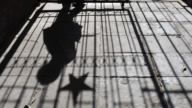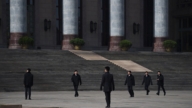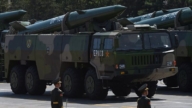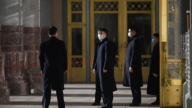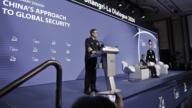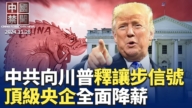【新唐人2012年12月26日訊】近來中共新政準備推出的官員財產申報制度,被官媒譽為「陽光法案」,似乎給期待中共改良的老百姓帶來了又一線希望。不過專家指出,中共的腐敗是整個政治的腐敗,經濟腐敗只是一個表象,所謂的陽光法案,卻是企圖用打擊經濟腐敗來減輕社會壓力,維持中共腐敗的政治體制。
大陸官方媒體最近報導,「中紀委」已著手起草《公職人員財產申報法》的建議稿。官員財產申報制度被視為反腐重大舉措。
目前中共進行官員申報財產主要集中在基層,採取官員內部申報辦法。今年7月以來,廣東試點橫琴新區處級以上幹部的家庭財產在內部公示,但廳級幹部無需申報。而韶關市始興縣,申報主體為科級幹部。
時政評論家藍述認為,中共作為一個特權黨,級別越高越能凌駕於法律之上,當局提出官員財產申報的制度,主要目地是為了減輕社會壓力,藍述說,如果真的想公布官員財產,應該從最高層開始。
時政評論家藍述:「大的官員不敢碰,抓小的官員也有一個保護手段,中紀委首先介入調查,背後會牽出誰,把所有的東西都摸清楚了之後,最後關起門來,各個派系之間進行妥協,決定犧牲誰、不犧牲誰,全部都決定好了之後它才進入法院程序,才公開,公開的目地是為了給社會一個交代,共產黨搞廉潔了。」
另外,由「中紀委」出手起草官員財產申報法案,也招來很多猜疑。不少人擔心,「黨內紀律部門」參與「國家法律制定」,是越俎代庖。
藍述:「直接放到法院,所有的媒體馬上聚焦,在法院公開的程序過程之中,被審判的貪官他可能交待出他後面是誰,被交代出來的貪官又會交待是誰,整個過程中共不可能預先知道,一下子就搞出一個政治地震,這是他為甚麼要中紀委先去處理的一個最主要的原因,它要把對中共統治的傷害降到最低程度。」
大陸律師唐吉田指認為,官員財產申報法案在中共法律制定的程序上沒有太大問題,但中紀委的公信力倍受質疑。唐吉田還說,應該是要求官員公開財產而不是申報財產。
大陸律師唐吉田:「可能它(中紀委)的代表性不夠,而且不應該是申報,應該是公開,以我們這幾十年的政治文化所形成的這種習慣,好多人他沒有壓力,沒有監督、沒有制約的情況下,我不相信他們會自覺的、如實的,把自己的財產向相關單位去登記。」
12月9號,廣東省試行官員財產公示試點名單誕生,試圖在珠海市橫琴新區、廣州市南沙新區、韶關市始興縣開始實行。
唐吉田指出,官員應該無條件的向民眾公開自己的財產,如果採取試點制,百姓的財產全部被貪官們搜刮完畢再來實施,沒有意義。唐吉田說,國外官員公開自己財產的精華部分,被中共給閹割了。
唐吉田:「正常國家一些行之有效的方法,在我們這塊土地上一些人經常會把它改頭換面,比較合理的比較正常的成分反倒被過濾掉了,一些讓他們規避社會制約、監督,規避他們推卸責任的某些內容,會被他們發揚光大。」
北京《國情內參》刊物首席研究員鞏勝利指出,中共從江澤民時代就開始所謂反腐,不過越反越腐。
北京《國情內參》首席研究員鞏勝利:「中共反腐敗沒完沒了,一代比一代腐敗的多,最麻煩的是,如果這個申報制度出籠的話,大多數的中共官員都要倒下去,如果大部分官員都倒下去,那共產黨再怎麼樣生存﹖」
「反腐亡黨,不反腐亡國」,已經成為中國人的共識。不過中共的歷次反腐鬥爭中,奉行著以經濟手段解決政治性問題。藍述指出,因為司法的不獨立,反腐往往成為中共內部互相打擊對方的一種工具。
採訪編輯/劉惠 後製/君卓
Property Declaration Policy Launched For China Officials
Recently, the Chinese Communist Party (CCP) launched a
policy requiring officials to declare their property.
The state media called it “Sunshine Law”.
It seems to bring some hopes to civilians.
However, experts pointed out that the CCP’s corruption
has an impact on its whole system.
The economic corruption only shows up the problems
on the surface.
The purpose of the “Sunshine Law” is to suppress economic
corruption leading to a reduction of the social pressure.
It is to make the CCP corrupted systems survive.
The state media in mainland China reported the Central
Commission for Discipline Inspection (CCDI) has drafted
a proposal of officials’ property declaration.
This is considered a major move towards anti-corruption.
The officials’ property declaration policy starts with
grassroots level officials internally.
Since July 2012, it has been tested in Guangdong.
The cadres above county level internally need to
declare their property.
However, ministerial level cadres don’t need to
declare anything.
The department level cadres at Shixing County
in Shaoguan are the officials to make the declaration.
Lan Shu, the Current Affairs Commentator believes the CCP
is a privileged party.
The higher level it is, the better off they can be above the law.
The purpose of the declaration policy is to reduce the
social pressure by apparently revealing officials’ interests.
Lan Shu said that if they really wanted to declare officials’
property, it should start from the top level.
Lan Shu: “They dare not to touch the high level; if they catch
an unimportant official, they would use a means of protection.
The CCDI investigates first, checking who has been involved,
after they make it clear, they discuss with related factions.
Then they decide who will be pulled out.
After the decision has been made, then it will enter the
law process. Finally publicizing it.
It is only to give the public the impression that the CCP
is cleaning up the corruption.”
It brought many questions that the draft law of declaration for
officials’ property was proposed by the CCDI.
People are worried that CCDI has involved itself in law making,
way beyond its role.
Lan Shu: “If corrupt officials were handed to the Court,
the Media will immediately focus in on them.
During the court procedure, the corrupt officials may
reveal who is the man behind them.
The man behind them will confess further; it is unpredictable.
It could bring about a political earthquake.
That’s the major reason why the CCDI involved at the
beginning, as it reduces the risk of damaging the CCP.”
Lawyer in mainland China, Tang Jitian believes
it shouldn’t be a problem on procedure to create an official’s property declaration policy.
However, the CCDI’s public credibility
is in doubt.
Tang said, they should request officials publicize property
rather than declaring their property.
Tang Jitian: “The CCDI hasn’t had enough credibility.
It shouldn’t declare but rather publicize.
Following several years of habits formed on political culture,
without applying pressure, supervision and restriction, officials
won’t automatically and truthfully declare their property.”
On Dec.9th a list of testing places to implement the officials’
declaring their property was formed.
It included Hengqin New District in Zhuhai, Nansha New
District in Guangzhou and Shixing county in Shaoguan.
Tian Jitian points out that officials should publicize their
property unconditionally.
If they only take several places to test, civilians’ property
will be all plundered by corrupt officials.
Then there is no meaning to do it after all.
Tang said that officials in foreign country publicize their
property and its essential meaning will be omitted by the CCP.
Tang Jitian: “Effective method used in other country
were changed completely here.
The essence parts are often filtered out.
Some parts on how to avoid restriction, supervision and
shift responsibilities were taken by the CCP.
Gong Shengli, chief researcher of
Guoqing Neican magazine said that
the CCP began to anti-corruption since Jiang Zemin era,
yet, more it has done, more it has been worsened.
Gong Shengli: “The CCP’s anti-corruption campaign
is endless. Yet one generation is worse than another.
The most trouble is, if the declaration policy is set, most CCP
officials will be removed. So how can the CCP survive?”
Chinese people understand, “Anti-corruption, the CCP will
collapse; if no anti-corruption, the country will collapse.”
In the CCP’s past history of anti-corruption, it followed the
method of using economic means to solve political problems.
Lan Shu said, because the judiciary isn’t independent,
anti-corruption became tools to fight against each other.


